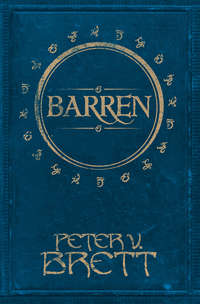
Полная версия
The Painted Man
Others, Arlen among them, forgot their work, drifting towards the newcomers. Selia whirled on them, having none of it. âThe day is no longer because the Messengerâs come!â she barked. âBack to your work!â
There were grumbles, but everyone went back to work. âNot you, Arlen,â Selia said, âcome here.â Arlen pulled his eyes from the Jongleur and went to her as the Messenger arrived.
âSelia Barren?â the Messenger asked.
âJust Selia will do,â Selia replied primly. The Messengerâs eyes widened, and he blushed, the tops of his pale cheeks turning a deep red above his beard. He leaped down from his horse and bowed low.
âApologies,â he said. âI did not think. Graig, your usual Messenger, told me thatâs what you were called.â
âItâs pleasing to know what Graig thinks of me after all these years,â Selia said, sounding not at all pleased.
âThought,â the Messenger corrected. âHeâs dead, maâam.â
âDead?â Selia asked, looking suddenly sad. âWas it â¦?â
The Messenger shook his head. âIt was a chill took him, not corelings. Iâm Ragen, your Messenger this year, as a favour to his widow. The guild will select a new Messenger for you starting next fall.â
âA year and a half again before the next Messenger?â Selia asked, sounding like she was readying a scolding. âWe barely made it through this past winter without the fall salt,â she said. âI know you take it for granted in Miln, but half our meat and fish spoiled for lack of proper curing. And what of our letters?â
âSorry, maâam,â Ragen said. âYour towns are well off the common roads, and paying a Messenger to commit for a month and more of travel each year is costly. The Messengersâ guild is shorthanded, what with Graig catching that chill.â He chuckled and shook his head, but noticed Seliaâs visage darken in response.
âNo offence meant, maâam,â Ragen said. âHe was my friend as well. Itâs just ⦠itâs not many of us Messengers get to go with a roof above, a bed below, and a young wife at our side. The night usually gets us before that, you see?â
âI do,â Selia said. âDo you have a wife, Ragen?â she asked.
âAy,â the Messenger said, âthough to her pleasure and my pain, I see my mare more than my bride.â He laughed, confusing Arlen, who didnât think having a wife not miss you was funny.
Selia didnât seem to notice. âWhat if you couldnât see her at all?â she asked. âWhat if all you had were letters once a year to connect you to her? How would you feel to hear your letters would be delayed half a year? There are some in this town with kin in the Free Cities. Left with one Messenger or another, some as much as two generations gone. Those people ent going to come home, Ragen. Letters are all we have of them, and they of us.â
âI am in full agreement with you, maâam,â Ragen said, âbut the decision is not mine to make. The Duke â¦â
âBut you will speak to the Duke upon your return, yes?â Selia asked.
âI will,â he said.
âShall I write the message down for you?â Selia asked.
Ragen smiled. âI think I can remember it, maâam.â
âSee that you do.â
Ragen bowed again, still lower. âApologies, for coming to call on such a dark day,â he said, his eyes flicking to the funeral pyre.
âWe cannot tell the rain when to come, nor the wind, nor the cold,â Selia said. âNot the corelings, either. So life must go on despite these things.â
âLife goes on,â Ragen agreed, âbut if thereâs anything I or my Jongleur can do to help; Iâve a strong back and Iâve treated coreling wounds many times.â
âYour Jongleur is helping already,â Selia said, nodding towards the young man as he sang and did his tricks, âdistracting the young ones while their kin do their work. As for you, Iâve much to do over the next few days, if weâre to recover from this loss. I wonât have time to hand the mail and read to those who havenât learned their letters.â
âI can read to those who canât, maâam,â Ragen said, âbut I donât know your town well enough to distribute.â
âNo need,â Selia said, pulling Arlen forward. âArlen here will take you to the general store in Town Square. Give the letters and packages to Rusco Hog when you deliver the salt. Most everyone will come running now that the saltâs in, and Ruscoâs one of the few in town with letters and numbers. The old crook will complain and try to insist on payment, but you tell him that in time of trouble, the whole town must throw in. You tell him to give out the letters and read to those who canât, or Iâll not lift a finger the next time the town wants to throw a rope around his neck.â
Ragen looked closely at Selia, perhaps trying to tell if she was joking, but her stony face gave no indication. He bowed again.
âHurry along, then,â Selia said. âLift your feet and youâll both be back as everyone is readying to leave here for the night. If you and your Jongleur donât want to pay Rusco for a room, any here will be glad to offer their homes.â She shooed the two of them away and turned back to scold those pausing in their work to stare at the newcomers.

âIs she always so ⦠forceful?â Ragen asked Arlen as they walked over to where the Jongleur was mumming for the youngest children. The rest had been pulled back to work.
Arlen snorted. âYou should hear her talk to the greybeards. Youâre lucky to get away with your skin after calling her âBarrenâ.â
âGraig said thatâs what everyone called her,â Ragen said.
âThey do,â Arlen agreed, âjust not to her face, unless theyâre looking to take a coreling by the horns. Everyone hops when Selia speaks.â
Ragen chuckled. âAnd her an old Daughter, at that,â he mused. âWhere I come from, only Mothers expect everyone to jump at their command like that.â
âWhat difference does that make?â Arlen asked.
Ragen shrugged. âDonât know, I suppose,â he conceded. âThatâs just how things are in Miln. People make the world go, and Mothers make people, so they lead the dance.â
âItâs not like that here,â Arlen said.
âIt never is, in the small towns,â Ragen said. âNot enough people to spare. But the Free Cities are different. Apart from Miln, none of the others give their women much voice at all.â
âThat sounds just as dumb,â Arlen muttered.
âIt is,â Ragen agreed.
The Messenger stopped, and handed Arlen the reins to his courser. âWait here a minute,â he said, and headed over to the Jongleur. The two men moved aside to talk, and Arlen saw the Jongleurâs face change again, becoming angry, then petulant, and finally resigned as he tried to argue with Ragen, whose face remained stony throughout.
Never taking his glare off the Jongleur, the Messenger beckoned with a hand to Arlen, who brought the horse over to them.
â⦠donât care how tired you are,â Ragen was saying, his voice a harsh whisper, âthese people have grisly work to do, and if you need to dance and juggle all afternoon to keep their kids occupied while they do it, then youâd damn well better! Now put your face back on and get to it!â He grabbed the reins from Arlen and thrust them at the man.
Arlen got a good look at the young Jongleurâs face, full of indignation and fear, before the Jongleur took notice of him. The second he saw he was being watched, the manâs face rippled, and a moment later he was the bright, cheerful fellow who danced for children.
Ragen took Arlen to the cart and the two climbed on. Ragen snapped the reins, and they turned back up the dirt path that led to the main road.
âWhat were you arguing about?â Arlen asked as the cart bounced along.
The Messenger looked at him a moment, then shrugged. âItâs Keerinâs first time so far out of the city,â he said. âHe was brave enough when there was a group of us and he had a covered wagon to sleep in, but when we left the rest of our caravan behind in Angiers, he didnât do near as well. Heâs got day-jitters from the corelings, and itâs made him poor company.â
âYou canât tell,â Arlen said, looking back at the cartwheeling man.
âJongleurs have their mummersâ tricks,â Ragen said. âThey can pretend so hard to be something theyâre not that they actually convince themselves of it for a time. Keerin pretended to be brave. The guild tested him for travel and he passed, but you never really know how people will hold up after two weeks on the open road until they do it for real.â
âHow do you stay out on the roads at night?â Arlen asked. âDa says drawing wards in the soilâs asking for trouble.â
âYour da is right,â Ragen said. âLook in that compartment by your feet.â
Arlen did, and produced a large bag of soft leather. Inside was a knotted rope, strung with lacquered wooden plates bigger than his hand. His eyes widened when he saw wards carved and painted into the wood.
Immediately, Arlen knew what it was: a portable warding circle, large enough to surround the cart and more besides. âIâve never seen anything like it,â Arlen said.
âTheyâre not easy to make,â the Messenger said. âMost Messengers spend their whole apprenticeship mastering the art. No wind or rain is going to smudge those wards. But even then, theyâre not the same as having warded walls and a door.
âEver see a coreling face-to-face, boy?â he asked, turning and looking at Arlen hard. âWatched it take a swipe at you with nowhere to run and nothing to protect you except magic you canât see?â He shook his head. âMaybe Iâm being too hard on Keerin. He handled his test all right. Screamed a bit, but thatâs to be expected. Night after night is another matter. Takes its toll on some men, always worried that a stray leaf will land on a ward, and then â¦â He hissed suddenly and swiped a clawed hand at Arlen, laughing when the boy jumped.
Arlen ran his thumb over each smooth, lacquered ward, feeling their strength. There was one of the little plates for every foot of rope, much as there would be in any warding. He counted more than forty of them. âCanât wind demons fly into a circle this big?â he asked. âDa puts posts up to keep them from landing in the fields.â
The man looked over at him, a little surprised. âYour daâs probably wasting his time,â he said. âWind demons are strong fliers, but they need running space or something to climb and leap from in order to take off. Not much of either in a cornfield, so theyâd be reluctant to land, unless they saw something too tempting to resist, like some little boy sleeping in the field on a dare.â He looked at Arlen in that same way Jeph did, when warning Arlen that the corelings were serious business. As if he didnât know.
âWind demons also need to turn in wide arcs,â Ragen continued, âand most of them have a wingspan larger than that circle. Itâs possible that one could get in, but Iâve never seen it happen. If it does, though â¦â He gestured to the long, thick spear he kept next to him.
âYou can kill a coreling with a spear?â Arlen asked.
âProbably not,â Ragen replied, âbut Iâve heard that you can stun them by pinning them against your wards.â He chuckled. âI hope I never have to find out.â
Arlen looked at him, wide-eyed.
Ragen looked back at him, his face suddenly serious. âMessengeringâs dangerous work, boy,â he said.
Arlen stared at him a long time. âIt would be worth it, to see the Free Cities,â he said at last. âTell me true, whatâs Fort Miln like?â
âItâs the richest and most beautiful city in the world,â Ragen replied, lifting his mail sleeve to reveal a tattoo on his forearm of a city nestled between two mountains. âThe Dukeâs Mines run rich with salt, metal, and coal. Its walls and rooftops are so well warded, itâs rare for the house wards to even be tested. When the sun shines on its walls, it puts the mountains themselves to shame.â
âNever seen a mountain,â Arlen said, marvelling as he traced the tattoo with a finger. âMy da says theyâre just big hills.â
âYou see that hill?â Ragen asked, pointing north of the road.
Arlen nodded. âBogginâs Hill. You can see the whole Brook from up there.â
Ragen nodded. âYou know what a âhundredâ means, Arlen?â he asked.
Arlen nodded again. âTen pairs of hands.â
âWell even a small mountain is bigger than a hundred of your Bogginâs Hills piled on top of each other, and the mountains of Miln are not small.â
Arlenâs eyes widened as he tried to contemplate such a height. âThey must touch the sky,â he said.
âSome are above it,â Ragen bragged. âAtop them, you can look down at the clouds.â
âI want to see that one day,â Arlen said.
âYou could join the Messengersâ guild, when youâre old enough,â Ragen said.
Arlen shook his head. âDa says the people that leave are deserters,â he said. âHe spits when he says it.â
âYour da doesnât know what heâs talking about,â Ragen said. âSpitting doesnât make things so. Without Messengers, even the Free Cities would crumble.â
âI thought the Free Cities were safe?â Arlen asked.
âNowhere is safe, Arlen. Not truly. Miln has more people and can absorb the deaths more easily than a place like Tibbetâs Brook, but the corelings still take a toll each year.â
âHow many people are in Miln?â Arlen asked. âWe have nine hundreds in Tibbetâs Brook, and Sunny Pasture up the ways is supposed to be almost as big.â
âWe have over thirty thousands in Miln,â Ragen said proudly.
Arlen looked at him, confused.
âA thousand is ten hundreds,â the Messenger supplied.
Arlen thought a moment, then shook his head. âThere ent that many people in the world,â he said.
âThere are and more,â Ragen said. âThereâs a wide world out there, for those willing to brave the dark.â
Arlen didnât answer, and they rode in silence for a time.

It took about an hour and a half for the trundling cart to reach Town Square. The centre of the Brook, Town Square held just over two dozen warded wooden houses for those whose trade did not have them working in the fields or rice paddies, fishing, or cutting wood. It was here one came to find the tailor and the baker, the farrier, the cooper, and the rest.
At the centre lay the square where people would gather, and the biggest building in the Brook, the general store. It had a large open front room that housed tables and the bar, an even larger storeroom in back, and a cellar below, filled with almost everything of value in the Brook.
Hogâs daughters, Dasy and Catrin, ran the kitchen. Two credits could buy a meal to leave you stuffed, but Silvy called old Hog a cheat, since two credits could buy enough raw grain for a week. Still, plenty of unmarried men paid the price, and not all for the food. Dasy was homely and Catrin fat, but Uncle Cholie said the men who married them would be set for life.
Everyone in the Brook brought Hog their goods, be it corn or meat or fur, pottery or cloth, furniture or tools. Hog took the items, counted them up, and gave the customers credits to buy other things at the store.
Things always seemed to cost a lot more than Hog paid for them, though. Arlen knew enough numbers to see that. There were some famous arguments when people came to sell, but Hog set the prices, and usually got his way. Just about everyone hated Hog, but they needed him all the same, and were more likely to brush his coat and open his doors than spit when he passed.
Everyone else in the Brook worked throughout the sun, and barely saw all their needs met, but Hog and his daughters always had fleshy cheeks, rounded bellies, and clean new clothes. Arlen had to wrap himself in a rug whenever his mother took his overalls to wash.
Ragen and Arlen tied off the mules in front of the store and went inside. The bar was empty. Usually the air inside the taproom was thick with bacon fat, but there was no smell of cooking from the kitchen today.
Arlen rushed ahead of the Messenger to the bar. Rusco had a small bronze bell there, brought with him when he came from the Free Cities. Arlen loved that bell. He slapped his hand down on it and grinned at the clear sound.
There was a thump in the back, and Rusco came through the curtains behind the bar. He was a big man, still strong and straight-backed at sixty, but a soft gut hung around his middle, and his iron-grey hair was creeping back from his lined forehead. He wore light trousers and leather shoes with a clean white cotton shirt, the sleeves rolled halfway up his thick forearms. His white apron was spotless, as always.
âArlen Bales,â he said with a patient smile, seeing the boy. âDid you come just to play with the bell, or do you have some business?â
âThe business is mine,â Ragen said, stepping forward. âYou Rusco Hog?â
âJust Rusco will do,â the man said. âThe townies slapped the âHogâ on, though not to my face. Canât stand to see a man prosper.â
âThatâs twice,â Ragen mused.
âSay again?â Rusco said.
âTwice that Graigâs journey log has led me astray,â Ragen said. âI called Selia âBarrenâ to her face this morning.â
âHa!â Rusco laughed. âDid you now? Well, thatâs worth a drink on the house, if anything is. What did you say your name was?â
âRagen,â the Messenger said, dropping his heavy satchel and taking a seat at the bar. Rusco tapped a keg, and plucked a slatted wooden mug off a hook.
The ale was thick and honey-coloured, and foamed to a white head on top of the mug. Rusco filled one for Ragen and another for himself. Then he glanced at Arlen, and filled a smaller cup. âTake that to a table and let your elders talk at the bar,â he said. âAnd if you know whatâs good for you, you wonât tell your mum I gave it to you.â
Arlen beamed, and ran off with his prize before Rusco had a chance to reconsider. He had sneaked a taste of ale from his fatherâs mug at festivals, but had never had a cup of his own.
âI was starting to worry no one was coming ever again,â he heard Rusco tell Ragen.
âGraig took a chill just before he was to leave last fall,â Ragen said, drinking deeply. âHis Herb Gatherer told him to put the trip off until he got better, but then winter set in, and he got worse and worse. In the end, he asked me to take his route until the guild could find another. I had to take a caravan of salt to Angiers anyway, so I added an extra cart and swung this way before heading back north.â
Rusco took his mug and filled it again. âTo Graig,â he said, âa fine Messenger, and a dangerous haggler.â Ragen nodded and the two men clapped mugs and drank.
âAnother?â Rusco asked, when Ragen slammed his mug back down on the bar.
âGraig wrote in his log that you were a dangerous haggler, too,â Ragen said, âand that youâd try to get me drunk first.â
Rusco chuckled, and refilled the mug. âAfter the haggling, Iâll have no need to serve these on the house,â he said, handing it to Ragen with a fresh head.
âYou will if you want your mail to reach Miln,â Ragen said with a grin, accepting the mug.
âI can see youâre going to be as tough as Graig ever was,â Rusco grumbled, filling his own mug. âThere,â he said, when it foamed over, âwe can both haggle drunk.â They laughed, and clashed mugs again.
âWhat news of the Free Cities?â Rusco asked. âThe Krasians still determined to destroy themselves?â
Ragen shrugged. âBy all accounts. I stopped going to Krasia a few years ago, when I married. Too far, and too dangerous.â
âSo the fact that they cover their women in blankets has nothing to do with it?â Rusco asked.
Ragen laughed. âDoesnât help,â he said, âbut itâs mostly how they think all Northerners, even Messengers, are cowards for not spending our nights trying to get ourselves cored.â
âMaybe theyâd be less inclined to fight if they looked at their women more,â Rusco mused. âHow about Angiers and Miln? The dukes still bickering?â
âAs always,â Ragen said. âEuchor needs Angiersâ wood to fuel his refineries, and grain to feed his people. Rhinebeck needs Milnâs metal and salt. They have to trade to survive, but instead of making it easy on themselves, they spend all their time trying to cheat each other, especially when a shipment is lost to corelings on the road. Last summer, demons hit a caravan of steel and salt. They killed the drivers, but left most of the cargo intact. Rhinebeck retrieved it, and refused to pay, claiming salvage rights.â
âDuke Euchor must have been furious,â Rusco said.
âLivid,â Ragen agreed. âI was the one that brought him the news. He went red in the face, and swore Angiers wouldnât see another ounce of salt until Rhinebeck paid.â
âDid Rhinebeck pay?â Rusco asked, leaning in eagerly.
Ragen shook his head. âThey did their best to starve each other for a few months, and then the Merchantsâ guild paid, just to get their shipments out before the winter came and they rotted in storage. Rhinebeck is angry at them now, for giving in to Euchor, but his face was saved and the shipments were moving again, which is all that mattered to anyone other than those two dogs.â
âWise to watch what you call the dukes,â Rusco warned, âeven this far out.â
âWhoâs going to tell them?â Ragen asked. âYou? The boy?â He gestured at Arlen. Both men laughed.
âAnd now I have to bring Euchor news of Riverbridge, which will make things worse,â Ragen said.
âThe town on the border of Miln,â Rusco said, âbarely a day out from Angiers. I have contacts there.â
âNot anymore, you donât,â Ragen said pointedly, and the men were quiet for a time.
âEnough bad news,â Ragen said, hauling his satchel onto the bar. Rusco considered it dubiously.
âThat doesnât look like salt,â he said, âand I doubt I have that much mail.â
âYou have six letters, and an even dozen packages,â Ragen said, handing Rusco a sheaf of folded paper. âItâs all listed here, along with all the other letters in the satchel and packages on the cart to be distributed. I gave Selia a copy of the list,â he warned.
âWhat do I want with that list, or your mailbag?â Rusco asked.
âThe Speaker is occupied, and wonât be able to distribute the mail and read to those that canât. She volunteered you.â
âAnd how am I to be compensated for spending my business hours reading to the townies?â Rusco asked.
âThe satisfaction of a good deed to your neighbours?â Ragen asked.
Rusco snorted. âI didnât come to Tibbetâs Brook to make friends,â he said. âIâm a businessman, and I do a lot for this town.â
âDo you?â Ragen asked.
âDamn right,â Rusco said. âBefore I came to this town, all they did was barter.â He made the word a curse, and spat on the floor. âThey collected the fruits of their labour and gathered in the square every Seventhday, arguing over how many beans were worth an ear of corn, or how much rice you had to give the cooper to make you a barrel to put your rice in. And if you didnât get what you needed on Seventhday, you had to wait until the next week, or go door to door. Now everyone can come here, any day, any time from sunup to sundown, and trade for credits to get whatever else they need.â






